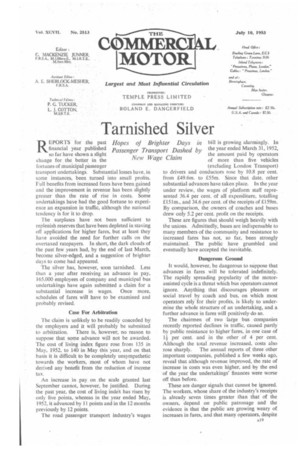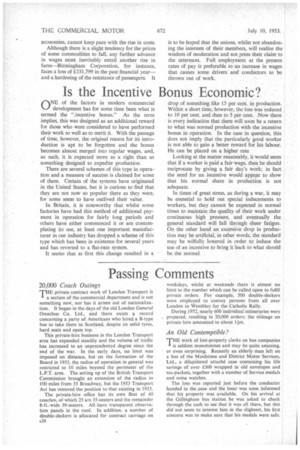Tarnished Silver
Page 21

Page 22

If you've noticed an error in this article please click here to report it so we can fix it.
REPORTS for the past financial year published so far have shown a slight change for the better in the fortunes of municipal passenger transport undertakings. Substantial losses have, in some instances, been turned into small profits_ Full benefits from increased fares have been gained and the improvement in revenue has been slightly greater than the rate of rise in costs. Some undertakings have had the good fortune to experience an expansion in traffic, although the national tendency is for it to drop.
The surpluses have not been sufficient to replenish reserves that have been depleted in staving off applications for higher fares, but at least they have avoided the need for further calls on the overtaxed ratepayers. In short, the dark clouds of the past few years had, by the end of last March, become silver-edged, and a suggestion of brighter clays to come had appeared.
The silver has, however, soon tarnished. Less than a year after receiving an advance in pay, 165,000 employees of company and municipal bus undertakings have again submitted a claim for a substantial increase in wages. Once more, schedules of fares will have to be examined and probably revised.
Case For Arbitration The claim is unlikely to be readily conceded by the employers and it will probably be submitted to arbittation. There is, however, no reason to suppose that some advance will not be awarded. The cost of living index figure rose from 135 in May, 1952, to 140 in May this year, and on that basis it is difficult to be completely unsympathetic towards the workers, most of whom have not derived any benefit from the reduction of income tax.
An increase in pay on the scale granted last September cannot, however, be justified. During the past year, the cost of living index has risen by only five points, whereas in the year ended May 1952, it advanced by 11 points and in the 12 months previously by 12 points.
The road passenger transport industry's wages bill is growing alarmingly. In the year ended March 31, 1952, the amount paid by operators of more than five vehicles (excluding London Transport) to drivers and conductors rose by 10.8 per cent. from £49.6m. to £55m. Since that date, other substantial advances have taken place. In the year under review, the wages of platform staff represented 36.4 per cent. of all expenditure, totalling £151m., and 34.6 per cent. of the receipts of £159m. By comparison, the owners of coaches and buses drew only 5.2 per cent. profit on the receipts.
These are figures that should weigh heavily with the unions. Admittedly, buses are indispensable to many members of the community and resistance to increased fares has not, so far, been strongly maintained. The public have grumbled and eventually have accepted the inevitable.
Dangerous Ground It would, however, be dangerous to suppose that advances in fares will be tolerated indefinitely. The rapidly spreading popularity of the motorassisted cycle is a threat which bus operators cannot ignore. Anything that discourages pleasure or social travel by coach and bus, on which most operators rely for their profits, is likely to undermine the whole structure of an undertaking, and, a further advance in fares will positively do so.
The chairmen of two large bus companies recently reported declines in traffic, caused partly by public resistance to higher fares, in one case of per cent. and in the other of 4 per cent. Although the total _revenue increased, costs also rose sharply. The annual reports of three other important companies, published a few weeks ago, reveal that although revenue improved, the rate of increase in costs was even higher, and by the end of the year the undertakings' finances were worse off than before.
These are danger signals that cannot be ignored. The workers, whose share of the industry's receipts is already seven times greater than that of the owners, depend on public patronage and the evidence is that the public are growing weary of increases in fares, and that many operators, despite economies, cannot keep pace with the rise in costs.
Although there is a slight tendency for the prices of some commodities to fall, any further advance in wages must inevitably entail another rise in fares--Birmingham Corporation, for instance, faces a loss of £331,799 in the past financial year— and a hardening of the resistance of passengers. It is to be hoped that the unions, whilst not abandoning the interests of their members, will realize the wisdom of moderation and not press their claim to the uttermost. Full employment at the present rates of pay is preferable to an increase in wages that causes some drivers and' conductors to be thrown out of work.












































































